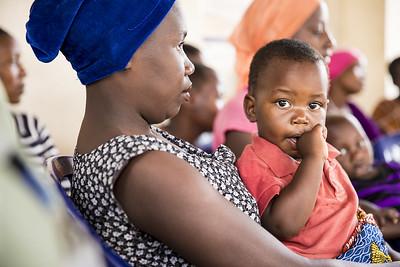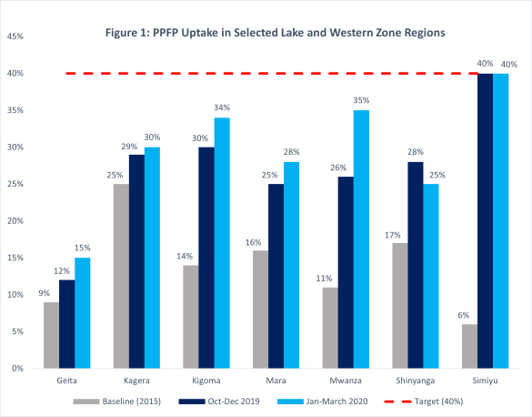
Seven regions in Tanzania’s Lake and Western Zones, previously low-performing with respect to family planning, are now showing notable progress in the provision of postpartum family planning (PPFP) services. The USAID-funded Boresha Afya project recently reported improvement in PPFP uptake—the percentage of postpartum women who accepted a modern family planning method among all women who delivered in project-supported facilities within the last six months. All seven of the project’s regions increased PPFP uptake since 2015, the year before the project began [1,2]. Simiyu Region attained the 40% national benchmark for all regions and remained at that level in the first (Oct-Dec 2019) and second (Jan-Mar 2020) quarters (see Figure 1).
This progress is a result of the Ministry of Health’s drive to ensure that reproductive, maternal, newborn, child, and adolescent health implementing partners, including Advance Family Planning (AFP) lead partner in Tanzania, the Johns Hopkins Center for Communication Programs (JHCCP), prioritized investing in these low-performing regions. AFP has supported advocacy efforts in six out of the seven regions (Geita, Kagera, Kigoma, Mara, Shinyanga, and Simiyu). Except for Kigoma Region, five transitioned from direct support in 2019; however, all seven are currently covered under media advocacy efforts.

JHCCP and its local partners Health Promotion Tanzania (HDT) and Tanzania Communication and Development Centre (TCDC) have engaged decision-makers to focus on PPFP and develop subnational PPFP plans since 2017. This advocacy culminated in the President’s Office – Regional and Local Government (PO-RALG) issuing a national policy directive in March 2019 requiring local government authorities to develop plans with specific PPFP targets to catalyze progress.
Out of AFP’s 10 focus regions in Tanzania’s mainland, six (Dar es Salaam, Geita, Kagera, Katavi, Mara, and Simiyu) developed such plans prior to PO-RALG directive and four (Kigoma, Manyara, Pwani, and Tabora) did so after. Other regions in the country are implementing the directive to further accelerate implementation of the National Family Planning Costed Implementation Plan II (2019-2023) [3], with PPFP as one of its four strategic priorities.
This effort also builds on previous AFP advocacy for better data and tracking of PPFP use and uptake. From November 2018 to February 2019, AFP partners successfully advocated for inclusion of PPFP indicators in the country’s health management information system as defined in the Reproductive Maternal Newborn Child and Adolescent II scorecards and the national CIP.
As part of its ongoing regional graduation process, AFP is consulting with other family planning partners to support and sustain advocacy efforts that have contributed to increased uptake of PPFP in these regions.
References
1. Track20. (2020). Using evidence to drive strategic decision making: FP Goals and the Tanzania CIP 2.0.
2. USAID Boresha Afya Project. (2020). Family Planning: PY4 (Q2) Progress and Achievements.
3. Ministry of Health, Community Development, Gender, Elderly and Children (MoHCDGEC), President’s Office - Regional Administration and Local Government (PORALG), U.S. Agency for International Development (USAID), and FHI360. The National Family Planning Costed Implementation Plan (NFPCIP) 2019-2023. The Challenge Initiative, 2019. Dar es Salaam, Tanzania, Durham, NC, USA and Washington, D.C., USA. https://tciurbanhealth.org/wp-content/uploads/2019/07/National-Family-Planning-Costed-Implementation-Plan-2019-2023-INSIDE-%E2%80%A2-F....pdf.

